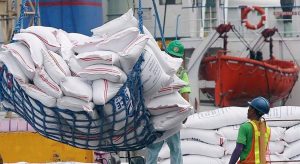THE Bureau of Customs (BoC) said it is counting on the reinstated excise tax on pickup trucks and a potential gradual increase in tariffs on rice imports to offset the revenue foregone as a result of Executive Order (EO) No. 62.
Assistant Commissioner Vincent Philip C. Maronilla told BusinessWorld by phone that these measures could help mitigate the fiscal impact of EO 62, which reduced import levies on rice, electric vehicles (EVs), pork, corn, and mechanically deboned poultry meat.
Customs blamed the P30 billion in revenue foregone due to EO 62 for missing its P939.6-billion collection target last year.
“We’ve also been expecting the implementation of (Capital Markets Efficiency Promotion Act) since last year. Again, that’s one of the things that we look at in order to balance out the reduction in tariff when it comes to EVs,” Mr. Maronilla said.
Republic Act No. 12214 or CMEPA reduced the stock transaction tax and documentary stamp tax.
The Department of Finance earlier estimated that CMEPA could generate P25 billion until 2030 for the Treasury.
“We see pickup trucks evolving into commuter vehicles. Also in being used in the same manner as some other SUVs (sport utility vehicle). There are also luxury pickup trucks already in the market,” he said.
Pickup trucks had been exempt from excise tax under the Tax Reform for Acceleration and Inclusion Law, to support small business owners and professionals.
In addition, Mr. Maronilla said the BoC is counting on proposals to gradually return the rice import tariff to 35% from the current 15%.
Any increase in the tariff is positive for Customs revenue, he said.
“We support the Department of Agriculture (on the tariff adjustment) not just because it’s going to mean more revenue, but I think the world prices of rice right now are falling, so increasing the tariff (won’t affect retail prices much),” Mr. Maronilla said.
This year, the BoC is hoping to collect P1.06 trillion, 14.28% higher than the actual collections of P931.05 billion in 2024.
In April, Customs revenue fell 7.48% to P74.7 billion. This brought year-to-date collections to P306.1 billion, up 2.16% from a year earlier.
Mr. Maronilla said surge of prices such as petroleum due to the escalation of the Middle East conflict means higher tariff collection, though he cautioned about the impact on inflation.
“As much as the Bureau wants to collect so much in terms of taxes on petroleum products, we want also to have a balance of economic gain and economic impact of these kinds of products,” it said.
President Ferdinand R. Marcos, Jr. has ordered agencies to prepare for potential spikes in global oil prices after the US intervened in the Israel-Iran war.
The government is considering additional targeted subsidies should prices surge, aside from the initially announced fuel subsidies.
Under the 2025 spending plan, the government allotted P2.5 billion in fuel subsidies to transport operators and farmers to contain the broader impact of high fuel costs on the prices of basic goods and services.
“We’re not seeing any effect of the conflict on other countries where we get most of our (energy) imports,” he said.
“Unless it escalates into something that’s reaching some other countries… then I don’t think that’s a point of concern.” — Aubrey Rose A. Inosante

